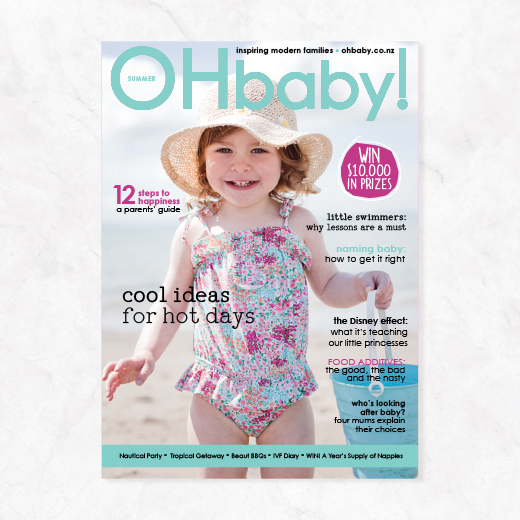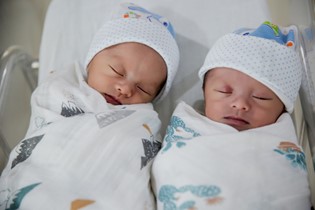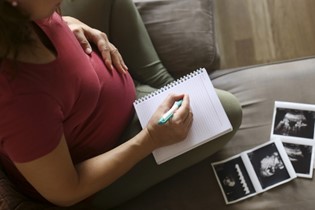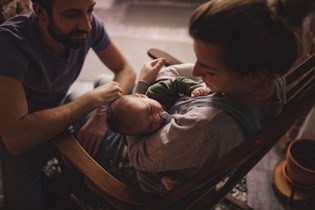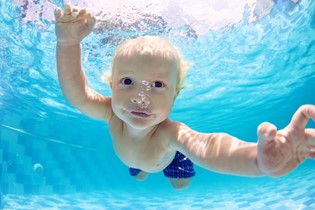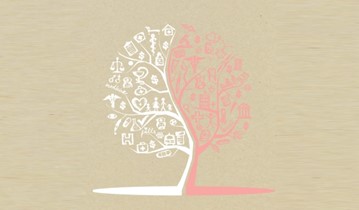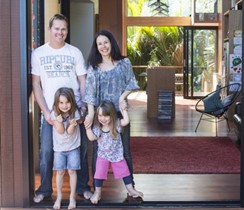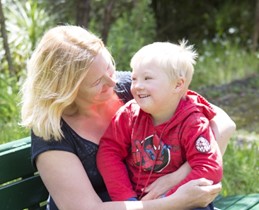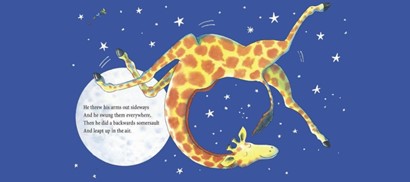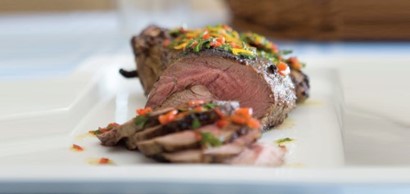Down Syndrome - One Family's Story
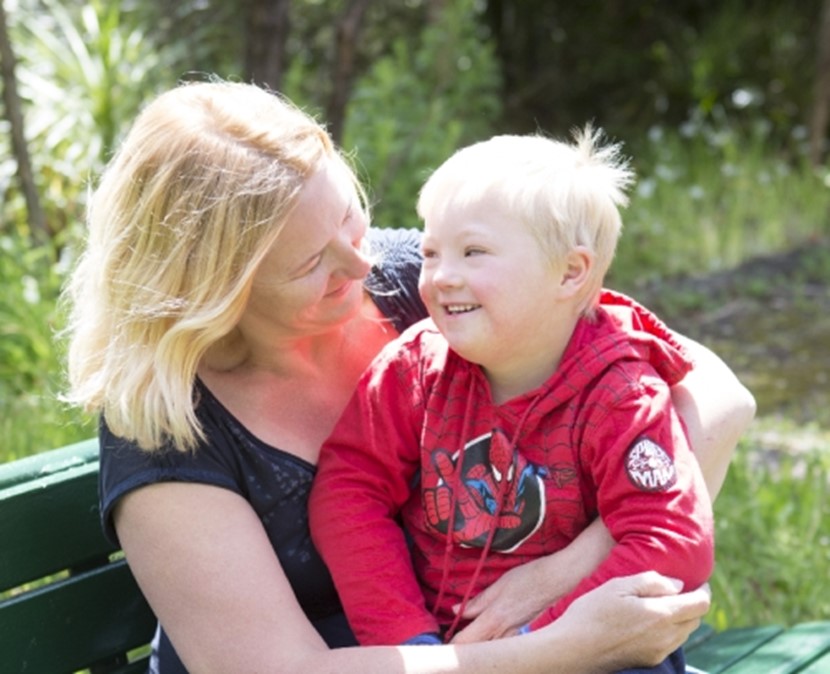
Louis, aged five, is a great ice-breaker. He's well-known in Titirangi, west Auckland, for his friendly disposition. He'll say hello to strangers, even taking them by the hand or surprising them with a big hug.
A lack of inhibition is characteristic of Down syndrome and Diana Court is happy to be known as Louis's mum when out and about.
She's much less happy about another common Down syndrome trait Louis has - running away. It's scary and stressful, especially when he has no real awareness of safety on the roads or in water.
She lost him for 15 minutes recently at a park in Henderson, Auckland, and now she's investigating buying a GPS tracker for him to wear at all times.
Diana had no idea Louis had Down syndrome for the first month of his life. He was the youngest of three boys. Oscar, the eldest, is nine and Charlie is seven. "
Diana didn't have the nuchal translucency (nuchal fold) test when she was pregnant with Louis - largely because she forgot. It was a low priority anyhow, because she says if she had found out there was no way she would have terminated the pregnancy.
Testing times
For many women though, the nuchal translucency test is routine. Mums everywhere will remember their babies' first prenatal scan at 12 weeks - it may have been their earliest glimpse of their little tadpole swimming in utero, with the tiny upturned nose or outstretched limb.
But one of the other reasons for having that 12-week scan is to measure the nuchal translucency, which assesses the risk of having a Down syndrome child.
Of course, other factors come into this risk assessment, such as the age of the mother, but for the majority the results show such a low risk that it's forgotten almost immediately. Of course, not all women go for the 12-week scan and you can opt out of having the nuchal translucency assessed.
But what happens for those who do go through with it if the risk is deemed high? For those who want to find out for sure there's amniocentesis or CVS (chorionic villus sampling) which both carry a small risk of causing miscarriage.
It's difficult to track exact figures on the number of Down syndrome pregnancies that are terminated. The Ministry of Health no longer collects those figures. But Mike Sullivan, spokesperson for Saving Downs, an advocacy group for Down syndrome, has figures he received through an Official Information Request to the Ministry of Health. They date from 2008 and show in that year there were 54 births and 62 terminations. That's around 54% of babies conceived with Down syndrome who were aborted, or 62 prospective mothers (and fathers) who had wanted a baby but for whatever reason decided against giving birth to a baby with Downs.
They then had to go through a gruelling termination and deal with whatever ensuing grief and guilt there may have been.
But in making a decision to terminate or not, is it a case, in these times of great medical leaps forward, of having too much information from the outset? Should we be grateful or annoyed at modern science for giving us the option to face up to such a weighty issue when we go for the 12-week scan?
If so, it's a problem that's likely to get a whole lot worse as there's talk of being able to do prenatal screening for all sorts of conditions and illnesses in the future.
Saving Downs' court action
There's now a counter attack from organisations supporting people with Down syndrome and their families. Saving Downs, with support from Spina Bifida New Zealand, are taking the government to the International Criminal Court over its antenatal screening programme for Down syndrome and other conditions.
Saving Downs says it is not opposed to the screening itself, but it strongly opposes what it says is one of its stated objectives, to stop these babies being born.
It's all about money, says Mike Sullivan from Saving Downs. He accuses the government of being motivated by the fact that it's cheaper to conduct screening and terminate certain pregnancies than to pay for the ongoing care needed for children with Down syndrome or other conditions.
But Mike says it's discriminatory to this sub-sector of society and, moreover, there's plenty of anecdotal evidence showing that many women who want to go through with the pregnancy are being pressured to terminate.
"It's the testimony from women who come to our group. A lot of them feel they've been treated quite poorly by the people they've trusted to care for them during their pregnancy."
Mike says women have reported being offered terminations after the 20-week mark and for those parents who have children with Downs there's an underlying feeling that others believe they should have prevented the child being born.
Mothers have been asked, "Didn't you have the test?"
And some people have openly said parents who proceed with the birth of a child with Downs should be denied state care for that child.
"It starts to get into that whole area of social responsibility and what's deemed a preventable birth," says Mike.
Saving Downs (with SBNZ) are not trying to get a conviction against the government over allowing termination on the grounds of foetal abnormality. It's seeking a policy shift aimed at preventing termination due to Downs or other conditions.
It wants to see the results of genetic screening used in a positive way, to be "solely directed towards life-affirming care". And it wants the ICC to condemn screening which reduces the population of people with Down syndrome through birth prevention.
Having a Down syndrome baby "doesn't need to be a life-shattering thing", adds Mike.
The New Zealand Down Syndrome Association also opposes termination on the grounds of a Downs diagnosis.
"There are so many stories of people with Down syndrome living great lives, who are active members of their community and who make valuable contributions to society," says national executive officer Zandra Vaccarino.
Counselling and support needed
The association is not alone in calling for more support for the women themselves during the screening process. It would like to see that process including counselling and up-to-date information about Downs.
And the Women's Health Action Trust, although singing from an entirely different song sheet, echoes these calls.
"Where women have found out there's a foetal abnormality they need to have access to support, counselling and information before making any decision."
The trust is pro-choice, which means it supports women in their decision to terminate a pregnancy regardless of the reason for doing so.
Besides anything else, it sees practical difficulties in trying to ring-fence foetal abnormality as a reason for termination.
But senior policy analyst for the trust, George Parker, says, "I'm aware there's work under way to make sure that women are getting the support they need."
Jane McEntee, Ministry of Health Group Manager, National Screening Unit, said in a statement: "The ministry is working with maternity providers to strengthen the support and information provided to women involved in antenatal screening. This includes a revised consumer brochure which will provide more information around the informed consent process and decision points in antenatal screening."
Hot topic
It's perhaps a sign of how contentious the issue of screening for Downs has become that finding medical professionals willing to talk about the issue proved difficult.
RANZCOG - the Australia and New Zealand body of obstetricians and gynaecologists - declined to answer specific questions but referred OHbaby! to statements on its website which suggest New Zealand is behind in providing counselling and information before and after prenatal screening.
And with talk of screening for other conditions such as autism and schizophrenia being discussed overseas, maybe it's time for society as a whole to decide what conditions it wants to avoid via prenatal testing and what conditions parents must simply live with.
According to some, 3500 genetic conditions in the unborn child could be routinely tested for a relatively low cost within just a few short years.
The ramifications of such a practice becoming widespread are certainly worth serious consideration - not just for the mums and dads undertaking the tests.
Life with Louis
Louis' mum Diana says from her point of view because she would never have considered termination, there was little point in having the test. "I'm not scared of life. Sure, it's not easy sometimes but life is a risk. Any one of us could die at any point," she says. Her own mother died of cancer when Diana was 16.
"I travelled around the world when I was young - a lot of people my age did - and life shapes you. My mother had a huge effect on the way I think and my life.
"And when I was travelling I saw a lot of poverty. That just helped me learn to be grateful for what we have and to accept life."
Diana says it's not her place to advise on whether women should terminate or not. "It's not my choice to make for people and it is down to choice."
But she urges them to be informed about what life for a child with Down syndrome is like "because, in my opinion it's a life worth living".
"You have to think about why you're having a child. I didn't have Louis so he could become prime minister or reach some lofty goal. I had him because I wanted a child to love and enjoy."
Finding out
Louis was born at home - Diana's third home birth - as soon she had him in her arms she noticed he was "floppy". Yet he didn't have the typical facial features of Down syndrome.
Three days later her midwife sensed something was wrong and referred Louis to a paediatrician, who told Diana and her husband Simon that their baby did not have Down syndrome. Ten days later, they were again told he didn't have Downs. It was only when Louis was a month old and seen by a genetic specialist that the diagnosis was made.
"It was quite a shock," says Diana.
"I hadn't had a lot to do with the disability world and I realised later that I had a pretty outdated notion of disability. The immediate picture was quite bleak.
"It took me three days to accept the diagnosis," she says. "But I kept looking at him and thinking, 'He's my baby and I love him. It doesn't matter.'
"And I think most mothers will love their children no matter what they look like or what disability they have. "Then I did a lot of reading and I realised it wasn't so bad."
Bright future
Diana found out that Louis's future was much more hopeful than she had been brought up to think.
Instead of Downs children being shut away in special residential care places, they now grow up and live lives not too different from their more able-bodied peers. They can go flatting, get jobs, have relationships. Quite a few even get their driver's licence. But at this stage very few men with Downs will go on to father children because the condition makes most of them infertile.
Louis is lucky - his only disability is Downs - he doesn't have the heart problems, hearing and sight problems, diabetes, celiac disease or intestinal issues that often accompany the diagnosis. And there's sometimes also a dual diagnosis with autism.
"Louis doesn't have much slowing him down!" says his mum.
Down syndrome is defined by an extra chromosome, Trisomy 21, which affects the way the brain and body develop.
But while he has an intellectual disability, Diana says Louis is actually quite smart and in many ways his intellect is on a par with other five year olds.
He's quick to pick up sign language - which is an essential tool because of his speech difficulties. He also quickly understands what others are saying. It's just that expressing himself is hard.
"Louis's biggest issue at the moment is talking. He knows what he wants to say and he's got a lot to say but he can't get it out. It's very frustrating."
He's also very good at picking up on emotional cues and instantly knows if someone likes him or not.
And with such an affectionate, emotional child, Diana can see why Down syndrome is described as the "Rolls Royce of disabilities".
"I think it's a really exciting time because our children are getting more support, better education and healthcare than any other generation.
In previous generations children with Downs were shut away in institutions but now they're being encouraged to live to their full potential.
"We don't know their limits so I've got really high hopes for the future."
More information on Down Syndrome

AS FEATURED IN ISSUE 20 OF OHbaby! MAGAZINE. CHECK OUT OTHER ARTICLES IN THIS ISSUE BELOW
